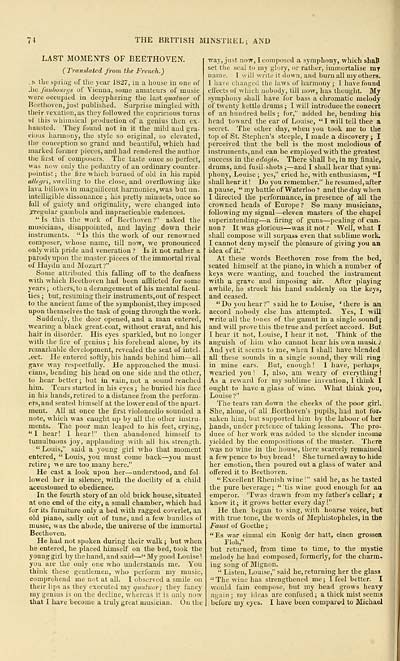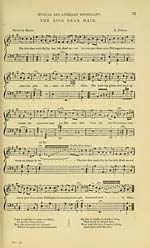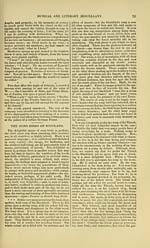Glen Collection of printed music > Printed music > British minstrel, and musical and literary miscellany
(82) Page 74
Download files
Complete book:
Individual page:
Thumbnail gallery: Grid view | List view

71
THE BRITISH MINSTREL; AND
LAST MOMENTS OF BEETHOVEN.
(Translated from the French.)
.N the spring of the year 1827, in a house in one of
Jie favhoiirgs of Vienna, some amateurs of music
were occupied in decyphering the last quattwr of
Beethoven, just published. Surprise mingled with
their vexation, as they followed the capricious turns
uf this whimsical production of a genius then ex-
hausted. Tliey found not in it the mild and gra-
cious harmony, the style so original, so elevated,
the conception so grand and beautiful, which had
marked former pieces, and had rendered the author
the lirst of composers. The taste once so perfect,
was now only the pedantry of an ordinary counter-
pointist; the lire which burned of old in his rapid
aliegri, swelling to the close, and overflowing like
lava billows in magniiieent harmonies, was but un-
intelligible dissonance ; his pretty minuets, once so
full of gaiety and originality, were changed into
jiTcguIar gambols and impracticable cadences.
" Is this the work of Beethoven ?" asked the
musicians, disappointed, and laying down their
instruments. " Is this the work of our renowned
composer, whose name, till now, we pronounced
only with pride and veneration ? Is it not rather a
parody upon tlie master-pieces of the immortal rival
of Haydn and Mozart '?"
Some attributed this falling off to the deafness
with which Beethoven had been afflicted for some
yeai"S; others, to a derangement of his mental facul-
ties ; but, resmning their instruments, out of respect
to the ancient fame of the symphonist, they imposed
upon themselves the task of going through the work.
Suddenly, the door opened, and a man entered,
wearing a black great-coat, without cravat, and his
hair in disorder. His eyes sparkled, but no longer
with the fire of genius ; his forehead alone, by its
remarkable development, revealed the seat of intel-
.ect. He entered softly, his hands behind him — all
gave way respectfully. He approached the musi-
cians, bending his head on one side and the other,
to hear better ; but in vain, not a sound reached
him. Tears started in his eyes ; he buried his face
in his hands, retired to a distance from the perform-
ers, and seated himself at the lower end of the apart-
ment. All at once the first violoncello sounded a
note, which was caught up by all the other instru-
ments. The poor man leaped to his feet, crying,
"I hear! I hear!" then abandoned himself to
tumultuous joy, applauding with all his strength.
" Louis," said a young girl who that moment
entered, " Louis, you must come back — you must
retire ; w e are too many here."
He cast a look upon her — understood, and fol-
lowed her in silence, with the docility of a child
accustomed to obedience.
In the fourth story of an old brick house, situated
at one end of the city, a small chamber, which had
for its furniture only a bed with ragged coverlet, an
old piano, sadly out of tune, and a few bundles of
music, was the abode, the universe of the immortal
Beethoven.
He had not spoken during their walk ; but when
he entered, he placed himself on the bed, took the
young girl by the hand, and said — " BIy good Louise !
you are the only one who understands me. You
think these gentlemen, who perform my music,
comprehend me not at all. I observed a smile on
their lips as they executed my guatuor; they fancy
my genius is on the decline, whereas it is only now
that I have become a truly great musician. On the
way, just now, I composed a symphony, which shaU
set the seal to my glory, or ratlier, immortalise my
name. I will write it down, and burn all my others.
I have changed the laws of harmony ; 1 have found
effects of wliich nobody, till now, has thought. My
symphony shall have for bass a chromatic melody
of twenty kettle drums ; I will introduce the concert
of an hundred bells ; for," added he, bending his
head toward the ear of Louise, "I will tell thee a
secret. The other day, when you took me to the
top of St. Stephen's steeple, I made a discovery ; I
perceived that the bell is the most melodious of
instruments, and can be employed with the greatest
success in the adaijio. There shall be, in my finale,
drums, and fusil-shots ; — and I shall hear that sym-
phony, Iiouise ; yes," cried he, with enthusiasm, "I
shall hear it ! Do you remember." he resumed, after
a pause, "my battle of Waterloo? and tlie day when
I directed the performance, in presence of all the
crowned heads of Europe ? So many musicians,
following my signal — eleven masters of the chapel
superintending — a firing of guns — pealing of can-
non? It was glorious — was it not? Well, what I
shall compose will surpass even that sublime work.
I cannot deny myself the pleasure of giving you an
idea of it."
At these words Beethoven rose from the bed,
seated himself at the piano, in which a number of
keys were wanting, and touched the instrument
with a graTe and imposing air. After playing
awhile, he struck his hand suddenly on the keys,
and ceased.
" Do you hear ?" s aid he to Louise, ' there is an
accord nobody else has attempted. Yes, I will
write all the tones of the gamut in a single sound;
and will prove this the true and perfect accord. But
I hear it not, Louise, I hear it not. Thirdc of the
anguish of him who cannot hear his own music ;
And yet it seems to me, when I shall liave blended
all these sounds in a single sound, they will ring
in mine ears. But, enough! I have, perliaps,
wearied you ! I, also, am weary of everything !
As a reward for my sublime invention, I think I
ought to have a glass of wine. What think you,
Louise ?"
The tears ran down the cheeks of the poor girl.
She, alone, of all Beethoven's pupils, had not for.
saken him, but supported him by the labour other
hands, under pretence of taking lessons. The pro-
duce of her work was added to the slender income
yielded by the compositions of the master. There
was no wine in the house, there scarcely remained
a few pence to buy bread ! She turned away to hide
her emotion, then poured out a glass of water and
oifered it to Beethoven.
"Excellent Rhenish wine !" said he, as he tasted
the pure beverage; "'tis wine good enough for an
emperor. 'Twas drawn from my father's cellar; t
know it; it grows better every day!"
He then began to sing, with hoarse voice, but
with true tone, the words of Mephistopheles, in the
Faust of Goethe ;
"Es war einmal ein Konig der hatt, einen grossen
Floh,"
but returned, from time to time, to the mystic
melody he had composed, formerly, for the charm-
ing song of Mignon.
" Listen, Louise," said he, returning her the glass
" The wine has strengthened me ; I feel better. I
would fain compose, but my head grows heavy
again ; my ideas are confused ; a thick mist seems
before my eyes. I have been compared to MichaeJ
THE BRITISH MINSTREL; AND
LAST MOMENTS OF BEETHOVEN.
(Translated from the French.)
.N the spring of the year 1827, in a house in one of
Jie favhoiirgs of Vienna, some amateurs of music
were occupied in decyphering the last quattwr of
Beethoven, just published. Surprise mingled with
their vexation, as they followed the capricious turns
uf this whimsical production of a genius then ex-
hausted. Tliey found not in it the mild and gra-
cious harmony, the style so original, so elevated,
the conception so grand and beautiful, which had
marked former pieces, and had rendered the author
the lirst of composers. The taste once so perfect,
was now only the pedantry of an ordinary counter-
pointist; the lire which burned of old in his rapid
aliegri, swelling to the close, and overflowing like
lava billows in magniiieent harmonies, was but un-
intelligible dissonance ; his pretty minuets, once so
full of gaiety and originality, were changed into
jiTcguIar gambols and impracticable cadences.
" Is this the work of Beethoven ?" asked the
musicians, disappointed, and laying down their
instruments. " Is this the work of our renowned
composer, whose name, till now, we pronounced
only with pride and veneration ? Is it not rather a
parody upon tlie master-pieces of the immortal rival
of Haydn and Mozart '?"
Some attributed this falling off to the deafness
with which Beethoven had been afflicted for some
yeai"S; others, to a derangement of his mental facul-
ties ; but, resmning their instruments, out of respect
to the ancient fame of the symphonist, they imposed
upon themselves the task of going through the work.
Suddenly, the door opened, and a man entered,
wearing a black great-coat, without cravat, and his
hair in disorder. His eyes sparkled, but no longer
with the fire of genius ; his forehead alone, by its
remarkable development, revealed the seat of intel-
.ect. He entered softly, his hands behind him — all
gave way respectfully. He approached the musi-
cians, bending his head on one side and the other,
to hear better ; but in vain, not a sound reached
him. Tears started in his eyes ; he buried his face
in his hands, retired to a distance from the perform-
ers, and seated himself at the lower end of the apart-
ment. All at once the first violoncello sounded a
note, which was caught up by all the other instru-
ments. The poor man leaped to his feet, crying,
"I hear! I hear!" then abandoned himself to
tumultuous joy, applauding with all his strength.
" Louis," said a young girl who that moment
entered, " Louis, you must come back — you must
retire ; w e are too many here."
He cast a look upon her — understood, and fol-
lowed her in silence, with the docility of a child
accustomed to obedience.
In the fourth story of an old brick house, situated
at one end of the city, a small chamber, which had
for its furniture only a bed with ragged coverlet, an
old piano, sadly out of tune, and a few bundles of
music, was the abode, the universe of the immortal
Beethoven.
He had not spoken during their walk ; but when
he entered, he placed himself on the bed, took the
young girl by the hand, and said — " BIy good Louise !
you are the only one who understands me. You
think these gentlemen, who perform my music,
comprehend me not at all. I observed a smile on
their lips as they executed my guatuor; they fancy
my genius is on the decline, whereas it is only now
that I have become a truly great musician. On the
way, just now, I composed a symphony, which shaU
set the seal to my glory, or ratlier, immortalise my
name. I will write it down, and burn all my others.
I have changed the laws of harmony ; 1 have found
effects of wliich nobody, till now, has thought. My
symphony shall have for bass a chromatic melody
of twenty kettle drums ; I will introduce the concert
of an hundred bells ; for," added he, bending his
head toward the ear of Louise, "I will tell thee a
secret. The other day, when you took me to the
top of St. Stephen's steeple, I made a discovery ; I
perceived that the bell is the most melodious of
instruments, and can be employed with the greatest
success in the adaijio. There shall be, in my finale,
drums, and fusil-shots ; — and I shall hear that sym-
phony, Iiouise ; yes," cried he, with enthusiasm, "I
shall hear it ! Do you remember." he resumed, after
a pause, "my battle of Waterloo? and tlie day when
I directed the performance, in presence of all the
crowned heads of Europe ? So many musicians,
following my signal — eleven masters of the chapel
superintending — a firing of guns — pealing of can-
non? It was glorious — was it not? Well, what I
shall compose will surpass even that sublime work.
I cannot deny myself the pleasure of giving you an
idea of it."
At these words Beethoven rose from the bed,
seated himself at the piano, in which a number of
keys were wanting, and touched the instrument
with a graTe and imposing air. After playing
awhile, he struck his hand suddenly on the keys,
and ceased.
" Do you hear ?" s aid he to Louise, ' there is an
accord nobody else has attempted. Yes, I will
write all the tones of the gamut in a single sound;
and will prove this the true and perfect accord. But
I hear it not, Louise, I hear it not. Thirdc of the
anguish of him who cannot hear his own music ;
And yet it seems to me, when I shall liave blended
all these sounds in a single sound, they will ring
in mine ears. But, enough! I have, perliaps,
wearied you ! I, also, am weary of everything !
As a reward for my sublime invention, I think I
ought to have a glass of wine. What think you,
Louise ?"
The tears ran down the cheeks of the poor girl.
She, alone, of all Beethoven's pupils, had not for.
saken him, but supported him by the labour other
hands, under pretence of taking lessons. The pro-
duce of her work was added to the slender income
yielded by the compositions of the master. There
was no wine in the house, there scarcely remained
a few pence to buy bread ! She turned away to hide
her emotion, then poured out a glass of water and
oifered it to Beethoven.
"Excellent Rhenish wine !" said he, as he tasted
the pure beverage; "'tis wine good enough for an
emperor. 'Twas drawn from my father's cellar; t
know it; it grows better every day!"
He then began to sing, with hoarse voice, but
with true tone, the words of Mephistopheles, in the
Faust of Goethe ;
"Es war einmal ein Konig der hatt, einen grossen
Floh,"
but returned, from time to time, to the mystic
melody he had composed, formerly, for the charm-
ing song of Mignon.
" Listen, Louise," said he, returning her the glass
" The wine has strengthened me ; I feel better. I
would fain compose, but my head grows heavy
again ; my ideas are confused ; a thick mist seems
before my eyes. I have been compared to MichaeJ
Set display mode to: Large image | Transcription
Images and transcriptions on this page, including medium image downloads, may be used under the Creative Commons Attribution 4.0 International Licence unless otherwise stated. ![]()
| Special collections of printed music > Glen Collection of printed music > Printed music > British minstrel, and musical and literary miscellany > (82) Page 74 |
|---|
| Permanent URL | https://digital.nls.uk/91435929 |
|---|
| Description | Scottish songs and music of the 18th and early 19th centuries, including music for the Highland bagpipe. These are selected items from the collection of John Glen (1833 to 1904). Also includes a few manuscripts, some treatises, and other books on the subject. |
|---|
| Description | The Glen Collection and the Inglis Collection represent mainly 18th and 19th century Scottish music, including Scottish songs. The collections of Berlioz and Verdi collected by bibliographer Cecil Hopkinson contain contemporary and later editions of the works of the two composers Berlioz and Verdi. |
|---|

